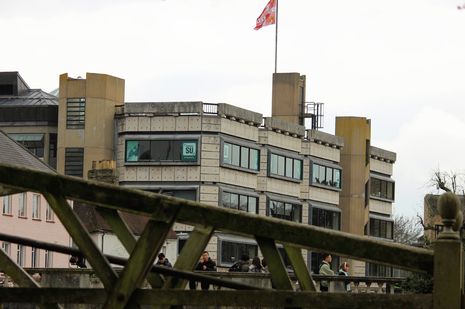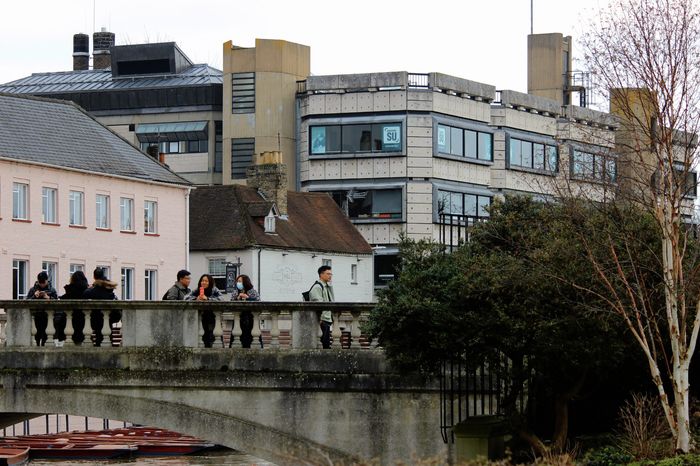SU referendums heat up as campaigners claim intervention
Voting closes tomorrow (30/10) for both NUS disaffiliation and arms divestment

Following a ruling on Friday (24/10), Cambridge Student’s Union (SU) sabbatical officers must take annual leave to campaign in referendums, with student campaigners alleging NUS involvement in the complaint behind the ruling.
Friday’s ruling passed by the Deputy Returning Officer stated that, according to the SU’s obligations under the 1994 Education Act to hold a “fairly and properly conducted election”, these obligations of fair campaigning “requires that no campaigners be paid by Cambridge SU”.
This would represent the NUS intervening in an SU election that the Union themselves has a significant stake in, as one of the two motions in the current referendum is for the Cambridge SU to disaffiliate from NUS.
It is not clear who launched the official complaint that resulted in the ruling.
Student campaigner sources told Varsity that it was NUS which lodged the official complaint. However, the NUS deny these allegations, stating they raised concerns about rules on sabbatical officers campaigning during paid time, claiming injustice regarding the fact SU officers “are full time campaigners, who can devote a lot of time to it, whereas the people running the affiliate campaign are students who are balancing work”.
However, the NUS claim they did not file any official complaint, and state the complaint was filed by a student.
The current referendum is on two policy motions: whether the SU should disaffiliate from the National Union of Students, and whether the SU should campaign to end university investments in occupation and arms manufacturing.
Voting will close tomorrow (30/10) at 5pm, having opened this Monday (27/10).
This comes as NUS members have been in Cambridge campaigning on the benefits of the NUS, which student campaigners have suggested indirectly breaches Cambridge SU Election and Referendum rules which state only Cambridge students can campaign in SU elections.
The new ruling that sabbatical officers may only campaign on unpaid time applies to all current referendums, meaning the current motion on university divestment from occupation and arms manufacturing will also be impacted.
Alex Stanley, Vice President Higher Education of the NUS, told Varsity, “It’s part of healthy political debate that if you’re putting something forward, specifically about the NUS, we should have a sort of right of reply.”
In response to criticisms about NUS presence and active campaigning in Cambridge during the referendum vote, Stanley stated, “what the guidelines say is that we can’t campaign on the referendum, it doesn’t say we can’t be in the city of Cambridge […] it doesn’t say that we can’t speak to the students that we represent.”
A campaigner for the YES campaign to disaffiliate from the NUS told Varsity: “The ruling for sabbatical officers to have to take annual leave to campaign, made after campaigning had already started and whilst paid NUS staff are flyering lecture sites, was a frustration both for the NUS disaffiliation campaign, and for the divestment campaign. However, it ultimately made us more steadfast in our work, with sabbs taking annual leave to campaign for what they believe is right for their students – NUS disaffiliation, and divestment from arms and occupation.”
NUS members have been spotted on Sidgwick Site handing out leaflets, which advertise different campaigns being run by the NUS and urges students to join these NUS campaigns.
An anonymous student campaigner told Varsity, “It is quite grave that the actions the NUS are taking are directly undermining other campaigns.” They continued, “They’ve not been supportive of any student activism that’s been happening, and when they do get involved it is self-serving.”
The complaint regarding Cambridge SU officers campaigning on paid time was lodged on Friday (24/10), which the Deputy Returning Officer (DRO), in charge of all SU elections, accepted.
SU sabbatical officers appealed the ruling later on Friday, and on Monday (27/10), received the communication that the appeal had been rejected, and the change had been introduced.
The leaflet handed out by NUS members on Cambridge faculty sites advertised the NUS campaign to keep the current Graduate Route visa rules in place, opposing government plans to cut the time international students can stay in the UK after graduation.
It featured a QR code and bold text urging students to ‘Scan the QR code’ and “Sign the NUS petition”, with the declaration at the bottom, “Join the thousands of people standing up for international students!”
When asked if NUS campaigners would continue to campaign in Cambridge next week, following the closure of referendum voting, Vice-President Stanley said this was “diary dependent”.
Amira Campbell, NUS National President, told Varsity: “I’m proud that our team is out talking to students across the UK. Over the past fortnight, we’ve spoken to four thousand students about the need for fair wages, fair funding and a fair future for students.
“International students are feeling the brunt of the hostile environment right now. We are in a crucial period to save the Graduate Route Visa and this week I’ve spoken to students whose friends are scared that they’ll be removed from the UK, who are in first year and already sacrificing social and rest activities because they’re so stressed about getting a graduate job and being able to stay in the place that they’ve built a home and community in, and grads who are mourning the end of friendships and relationships torn apart by the UK’s unfair and cruel visa system.
“I hope that every single student we’ve spoken to this week in Cambridge gets active in our campaign to save the visa, and shows up to stand with international students when they need it most.”
 News / Judge Business School advisor resigns over Epstein and Andrew links18 February 2026
News / Judge Business School advisor resigns over Epstein and Andrew links18 February 2026 News / Gov grants £36m to Cambridge supercomputer17 February 2026
News / Gov grants £36m to Cambridge supercomputer17 February 2026 News / Hundreds of Cambridge academics demand vote on fate of vet course20 February 2026
News / Hundreds of Cambridge academics demand vote on fate of vet course20 February 2026 News / CUCA members attend Reform rally in London20 February 2026
News / CUCA members attend Reform rally in London20 February 2026 News / Union speakers condemn ‘hateful’ Katie Hopkins speech14 February 2026
News / Union speakers condemn ‘hateful’ Katie Hopkins speech14 February 2026










